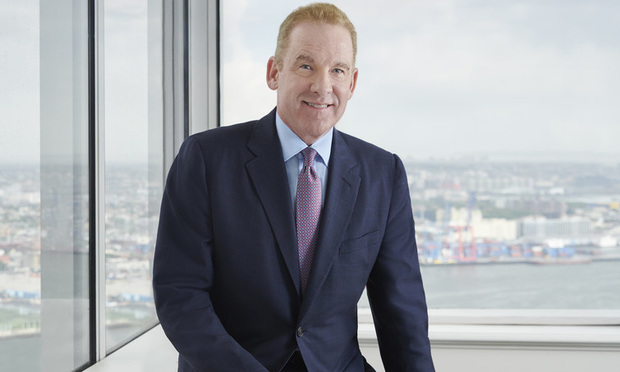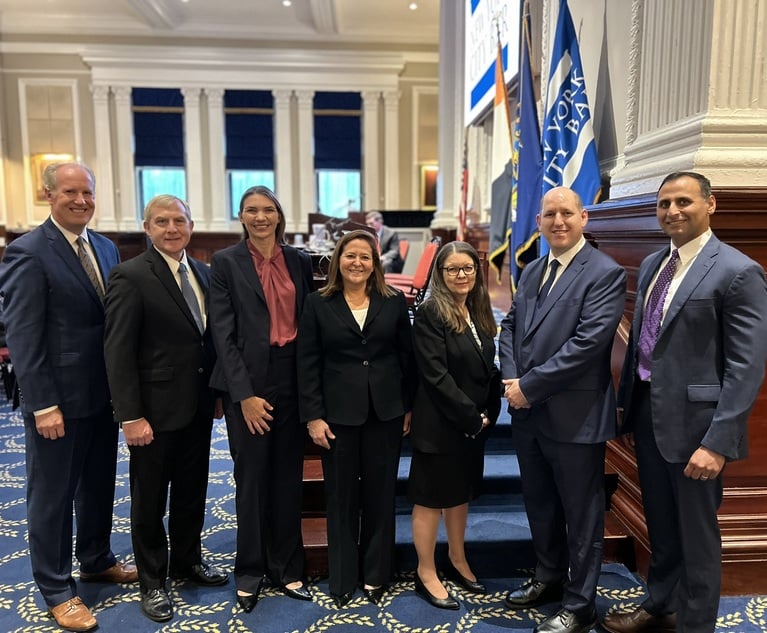Attorney of the Year Finalist: Robert Giuffra
Giuffra frequently handles high profile white-collar defense, product liability and employment litigation matters. He also helps to secure legal services funding for low-income New Yorkers.
October 21, 2019 at 11:02 AM
5 minute read
 Robert Giuffra, partner, Sullivan & Cromwell
Robert Giuffra, partner, Sullivan & Cromwell
Litigation may have cooled off since the financial crisis, but someone forgot to tell Robert Giuffra.
Over the past year, the Sullivan & Cromwell partner has represented Goldman Sachs in class actions that accuse it of discriminating against women and lying to investors about conflicts of interest, represented a witness in Special Counsel Robert Mueller's investigation, worked for Boeing's directors in suits over its grounded 737 MAX aircraft, helped Fiat Chrysler Automobiles ink settlements worth about $800 million over diesel vehicles, and went to bat for UBS in a case that tests the limits of the finance industry law known as FIRREA.
On top of all that, he's continued to represent Volkswagen in its global response to the so-called Dieselgate scandal. While the company agreed early on to spend billions of dollars buying back affected vehicles, the Securities and Exchange Commission took until this year to sue over the scandal, and Giuffra has continued his regular travels to Germany to liaise with the automaker.
"It's been incredibly busy," he said. "I'm kind of at a point in my career where there's just a lot of very interesting and complicated and rewarding cases that come my way."
Giuffra, 59, is especially well-known for his work on securities cases—he helped write the Private Securities Litigation Reform Act in the 1990s. But today clients seek his help when faced with a wide variety of scandals and legal threats. White-collar crime, product liability and employment law are all in his wheelhouse.
For instance, Giuffra has represented Fiat Chrysler Automobiles and its affiliates through years of disputes, arguing for dismissal twice and filing papers to oppose class certification. The Fiat cases, brought by consumers, resellers, and federal and state governments, were finally settled earlier this year after years of investigation, testing and litigation related to about 104,000 EcoDiesel-branded Jeep and Dodge vehicles.
The consumer settlement is worth as much as $307 million. The automaker also agreed to pay $311 million to federal authorities and $19 million to California and to undertake a recall and mitigation program worth up to $185 million. Those figures are well below the $4.6 billion in potential penalties that Fiat Chrysler originally mentioned to its investors.
Meanwhile, in another high-profile matter within the last two years, Giuffra has represented K.T. McFarland, the former deputy national security adviser in the Trump administration. In an interview, she said he has helped her navigate questioning and issues of executive privilege in meetings with Mueller's office and with Congressional staff. He brought intense focus to the job, she said.
"In one of the congressional committee interviews, he sits back and sort of folds his arms, puts his head on his chest, closes his eyes," she said. "I'm thinking to myself, 'he's not even paying attention!' and all of a sudden, he interrupted and he clarified the question I was being asked, which allowed me to clarify my answer."
To be sure, Giuffra says he couldn't handle all the work without the team behind him. From young associates to other partners and the legal graphic designers who are willing to make changes to his slide decks in the middle of the night, a lot of people make his work possible. Says Greg Palm, who recently retired as Goldman Sachs' general counsel, "He's only too willing or happy, if someone has a good idea, to use it."
There are some qualities that are uniquely Giuffra, though. Several people note his energy, the fast clip at which he speaks that makes the most of whatever time has been allotted for oral argument. Palm said another thing that sets Giuffra apart is that he truly hates losing.
"I just picked up on it immediately," said Palm. "Most people don't like losing, I suppose you might tell me, but I can tell it's much more painful to him. He just doesn't like it, and that's actually important."
Of course, not every case is a winner. Elizabeth Cabraser, whose firm Lieff Cabraser Heimann & Bernstein has faced off against Giuffra and his colleagues in several matters, said the trust his clients place in him was key to achieving a settlement in the Volkswagen case that satisfied her clients, the court and the government.
"He has been … a very effective counselor to his clients, she said. "That sometimes means telling the client something it doesn't want to hear."
Giuffra also pours his energy into work outside of the courtroom. Helaine Barnett, a former top official with the Legal Aid Society who now runs the New York State Permanent Commission on Access to Justice, said Giuffra has put his firm's resources at the commission's disposal. He has lined up business leaders, including a top official from J.P. Morgan Chase & Co., to make the case for funding civil legal services for the poor, and rallied consultants who found that every $1 spent on such services spares the need for another $10 spent on services like emergency housing.
"He is not one-dimensional, as some lawyers are," said Jonathan Lippman, the former chief judge of New York's Court of Appeal, now at Latham & Watkins, who appointed Giuffra to the commission. "You can't measure Bob by left, right, conservative, liberal—Bob crosses all the lines. … He's very human, very approachable."
For his part, Giuffra says he is always thinking about the social impact of his work. Whether it's helping Volkswagen, with its hundreds of thousands of employees, avert the risk of bankruptcy, or helping secure legal services funding for low-income New Yorkers, he sees a common thread.
"Lawyers in private practice can do public service," he said.
This content has been archived. It is available through our partners, LexisNexis® and Bloomberg Law.
To view this content, please continue to their sites.
Not a Lexis Subscriber?
Subscribe Now
Not a Bloomberg Law Subscriber?
Subscribe Now
NOT FOR REPRINT
© 2025 ALM Global, LLC, All Rights Reserved. Request academic re-use from www.copyright.com. All other uses, submit a request to [email protected]. For more information visit Asset & Logo Licensing.
You Might Like
View All
Elizabeth Cooper of Simpson Thacher on Building Teams in a 'Relationship Business'
4 minute read
For Paul Weiss, Progress Means 'Embracing the Uncomfortable Reality'
5 minute read
Kenneth Feinberg Had Dreams of Being on the Big Screen. His 9/11 Victims Fund Gave Him an Unexpected Star Turn

City Bar Holds 32nd Annual Henry L. Stimson Medal Presentation
Trending Stories
- 1Is It Time for Large UK Law Firms to Begin Taking Private Equity Investment?
- 2Federal Judge Pauses Trump Funding Freeze as Democratic AGs Launch Defensive Measure
- 3Class Action Litigator Tapped to Lead Shook, Hardy & Bacon's Houston Office
- 4Arizona Supreme Court Presses Pause on KPMG's Bid to Deliver Legal Services
- 5Bill Would Consolidate Antitrust Enforcement Under DOJ
Who Got The Work
J. Brugh Lower of Gibbons has entered an appearance for industrial equipment supplier Devco Corporation in a pending trademark infringement lawsuit. The suit, accusing the defendant of selling knock-off Graco products, was filed Dec. 18 in New Jersey District Court by Rivkin Radler on behalf of Graco Inc. and Graco Minnesota. The case, assigned to U.S. District Judge Zahid N. Quraishi, is 3:24-cv-11294, Graco Inc. et al v. Devco Corporation.
Who Got The Work
Rebecca Maller-Stein and Kent A. Yalowitz of Arnold & Porter Kaye Scholer have entered their appearances for Hanaco Venture Capital and its executives, Lior Prosor and David Frankel, in a pending securities lawsuit. The action, filed on Dec. 24 in New York Southern District Court by Zell, Aron & Co. on behalf of Goldeneye Advisors, accuses the defendants of negligently and fraudulently managing the plaintiff's $1 million investment. The case, assigned to U.S. District Judge Vernon S. Broderick, is 1:24-cv-09918, Goldeneye Advisors, LLC v. Hanaco Venture Capital, Ltd. et al.
Who Got The Work
Attorneys from A&O Shearman has stepped in as defense counsel for Toronto-Dominion Bank and other defendants in a pending securities class action. The suit, filed Dec. 11 in New York Southern District Court by Bleichmar Fonti & Auld, accuses the defendants of concealing the bank's 'pervasive' deficiencies in regards to its compliance with the Bank Secrecy Act and the quality of its anti-money laundering controls. The case, assigned to U.S. District Judge Arun Subramanian, is 1:24-cv-09445, Gonzalez v. The Toronto-Dominion Bank et al.
Who Got The Work
Crown Castle International, a Pennsylvania company providing shared communications infrastructure, has turned to Luke D. Wolf of Gordon Rees Scully Mansukhani to fend off a pending breach-of-contract lawsuit. The court action, filed Nov. 25 in Michigan Eastern District Court by Hooper Hathaway PC on behalf of The Town Residences LLC, accuses Crown Castle of failing to transfer approximately $30,000 in utility payments from T-Mobile in breach of a roof-top lease and assignment agreement. The case, assigned to U.S. District Judge Susan K. Declercq, is 2:24-cv-13131, The Town Residences LLC v. T-Mobile US, Inc. et al.
Who Got The Work
Wilfred P. Coronato and Daniel M. Schwartz of McCarter & English have stepped in as defense counsel to Electrolux Home Products Inc. in a pending product liability lawsuit. The court action, filed Nov. 26 in New York Eastern District Court by Poulos Lopiccolo PC and Nagel Rice LLP on behalf of David Stern, alleges that the defendant's refrigerators’ drawers and shelving repeatedly break and fall apart within months after purchase. The case, assigned to U.S. District Judge Joan M. Azrack, is 2:24-cv-08204, Stern v. Electrolux Home Products, Inc.
Featured Firms
Law Offices of Gary Martin Hays & Associates, P.C.
(470) 294-1674
Law Offices of Mark E. Salomone
(857) 444-6468
Smith & Hassler
(713) 739-1250






